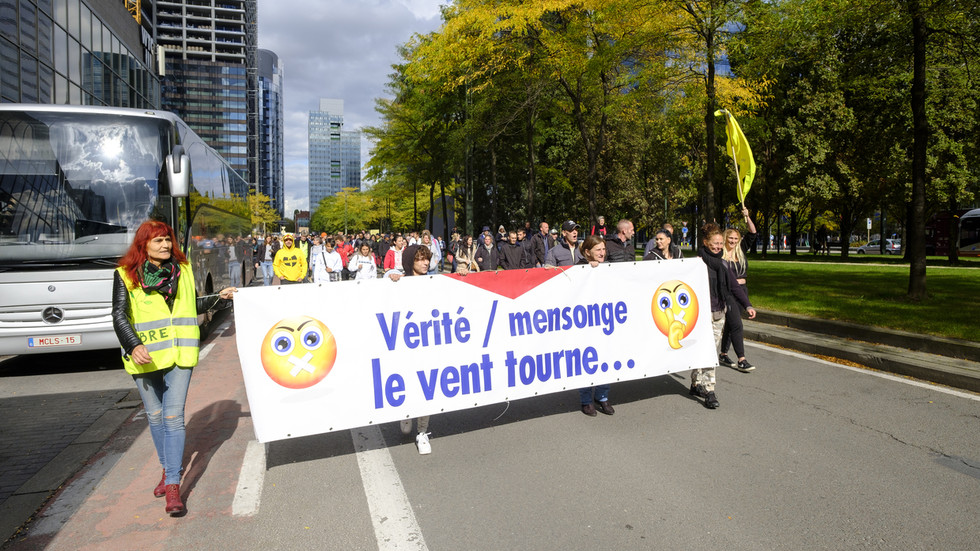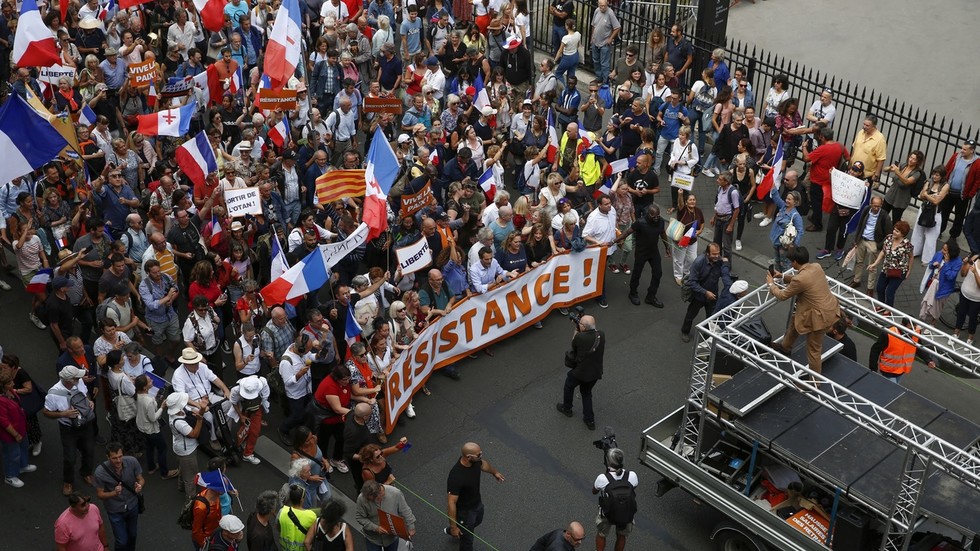fifty_five
Jedi Master
or if 12 pm a midnight munchies

Канада хочет передать ФРГ оставшиеся пять турбин для "Северного потока"23:15 08/24/2022 (updated: 09:16 08/25/2022)
Canada wants to transfer the remaining five turbines for Nord Stream to Germany
Canadian Foreign Minister Melanie Joly announced the transfer of five turbines for Nord Stream to Germany
WASHINGTON, Aug 24 — RIA Novosti. Ottawa plans to transfer to Germany five gas turbines for the Nord Stream gas pipeline, which are still under repair in Montreal, Canadian Foreign Minister Melanie Joly said in an interview with CBC.
"That was the decision we made. This is exactly what Germany asked us to do," Joly said.
In Germany, an energy collapse is predicted in winter due to the likely termination of supplies of natural gas from Russia. Economy Minister Robert Habek and the head of the Federal Grid Agency Klaus Mueller have repeatedly called on citizens to save electricity, water and heat.
In addition, the whole of Europe is facing a serious fuel shortage, since the main Russian highway Nord Stream operates at only 20 percent of the total capacity. Gazprom explained this by improper maintenance and a delay in the return of Siemens turbines from repair. Now only one of the five engines is involved in the operation of the highway.
A particular difficulty arose with the return of the turbine, which was undergoing repair in Canada. Because of the sanctions against Gazprom, the local government issued a permit for the removal, on 10 July, but did not consider it of the terms of the contract and sent the engine to Germany, but not in Russia. Further transportation requires permits from the EU and London authorities.
As the Russian Embassy in Berlin stressed earlier, the delivery of the turbine for Nord Stream to Germany after repair in Canada does not meet the terms of the contract, Russia requires confirmation that it and other parts that require maintenance will not become objects of restrictions of Canada, the UK and the European Union.
Стоимость газа в Европе впервые с марта превысила $3200 за тысячу кубометровThe cost of gas in Europe for the first time since March exceeded $3,200 per thousand cubic meters
August 25, 2022, 10:40
Exchange prices for gas in Europe exceeded $3.2 thousand per 1 thousand cubic meters for the first time since March, according to data from the London ICE exchange.
The cost of the September futures on the TTF hub in the Netherlands rose to $3,215 per 1,000 cubic meters, TASS reports.
It is noted that the price has increased by more than 7% since the beginning of trading.
Earlier, the Russian company Gazprom said that gas prices in Europe in winter could exceed $4 thousand per 1 thousand cubic meters.
Поляки без угля из России вспомнили времена коммунизма03:02 29.08.2022
Poles without coal from Russia remembered the times of communism
Reuters: residents of Poland lined up for coal, remembering the times of communism
MOSCOW, Aug 29 - RIA Novosti. The ban on coal imports from Russia forced Poles to recall communist times, Reuters reports.
In the city of Lublin, dozens of cars of local residents lined up in front of the Lubelski Wegiel Bogdanka mine. The wait, the publication notes, can stretch for many hours and even a day.
"It's beyond imagination. I remember the times of communism, but it never occurred to me that we could return to something even worse," the agency quotes one of those standing in line.
Poland in April completely banned the import of coal from Russia, which dramatically affected the availability of coal on the market and its price. The cost of a ton of coal from private suppliers reaches three thousand zlotys (about $ 640). The Ministry of Climate and Environment of Poland in the current situation in early July canceled for 60 days the requirements for the quality of coal used for heating.
Former Deputy Prime Minister and ex-Minister of Economy of the republic Janusz Pehocinski, in turn, warned that Poland expects an "expensive winter" in terms of the cost of coal. At the same time, he noted that there was a significant decrease in coal production in the country.
Earlier, the Polish fuel concern ORLEN predicted a three-fold increase in the price of natural gas by the end of 2022. The concern also expects an increase in electricity prices by 2.6 times.
With the beginning of the Russian special operation to demilitarize and denazify Ukraine, the West has increased sanctions pressure on Moscow. Many countries have announced the freezing of Russian assets, and calls to abandon energy resources from Russia have become louder. These measures turned into problems for Europe and the United States, provoking an increase in food and fuel prices.
Hurriyet: Греция впервые применила ЗРК С-300 против турецких F-162022-08-28
Hurriyet: Greece for the first time used the S-300 air defense system against the Turkish F-16
The incident occurred during another Turkish provocation with an attempt to enter the airspace of Greece. As it became known, Greece used its S-300 complexes, which not only began to irradiate the F-16 fighters of the Turkish Air Force, but were also ready to open fire on combat aircraft if the latter violated the border of Greek airspace, as evidenced by the detection of a signal about preparing for an attack.
The incident occurred near the island of Rhodes, while, as the Turkish Hurriyet newspaper notes, Greece was ready to launch a missile at the first opportunity, despite the fact that there are certain agreements between NATO countries on this matter.
"The Russian-made Greek S-300 air defense deployed on the island of Crete, during the F-16 combat flights of the Turkish Air Force Command in the Aegean Sea and the Eastern Mediterranean, triggered the emergency warning systems on one of the combat aircraft. It is recorded that the target tracking and missile guidance radar of the S-300 system detected a surface-to-air missile on an F-16 that was carrying out a reconnaissance mission at an altitude of 10,000 feet west of Rhodes. It was also stated that, despite the hostile actions, the aircraft completed the planned tasks and returned safely to their bases. Sources in the ministry said that the incident showed that Greece actively used the batteries in question, stressing that incidents involving the use of air defense means are expressed as "hostile actions" in accordance with the NATO system of rules of engagement," the Turkish Hurriyet newspaper said.
To date, this is the first time that Greece has tried to use its air defense systems against a Turkish fighter, which are not controlled by the NATO common air defense system. Moreover, taking into account the remoteness of the Turkish combat aircraft from Rhodes, the Turkish fighter would almost certainly have been destroyed.
Польский политик Качиньский намерен потребовать от ФРГ 1,3 триллиона долларов репарацийPolish politician Kaczynski intends to demand 1.3 trillion dollars of reparations from Germany
16:49
The Polish authorities are determined to appeal to the German leadership with a demand for $1.3 trillion in reparations for World War II. This statement was made by the head of the ruling Polish Law and Justice Party (PiS) Jaroslaw Kaczynski.
He is sure that this amount is quite real for Germany. The politician admitted that in the future it could become much higher.
"The amount that was presented as the cost of damage is 6 trillion 200 billion zlotys (1.3 trillion dollars — Ed.)," Kaczynski said.
According to the PiS leader, Berlin still has not paid the price for its actions against Warsaw during the war period. Kaczynski expressed dissatisfaction that some "Nazi criminals" have become high-ranking officials in modern Germany.







JPMorgan CEO Jamie Dimon has gone into doomer territory - warning that while the US economy is "actually still doing well" at the moment, there are "very, very serious things which I think are likely to push the US and the world" into Recession.

"I mean, Europe is already in recession - and they're likely to put the US in some kind of recession six to nine months from now," Dimon told CNBC's Julianna Tatelbaum on Monday.
Dimon also cited runaway inflation and interest rates shooting up more than expected, as well as the unknown effects of QE and the war in Ukraine.
"These are very, very serious things which I think are likely to push the U.S. and the world — I mean, Europe is already in recession — and they’re likely to put the U.S. in some kind of recession six to nine months from now," he said.
Dimon said that while the Fed raised "waited too long and did too little," that the central bank is "clearly catching up."
"From here we let’s all wish him success and keep our fingers crossed that they managed to slow down the economy enough so that whatever it is, is mild — and it is possible," he continued.
How long might a recession last?
"It can go from very mild to quite hard and a lot will be reliant on what happens with this war. So, I think to guess is hard, be prepared," Dimon said, adding that the one thing he could be sure of was market volatility - which could coincide with disorderly financial conditions."
Dimon also suggested that the S&P 500 could fall by "another easy 20%" from current levels, adding that "the next 20% would be much more painful than the first."
In June, Dimon warned of an "economic hurricane," adding "you'd better brace yourself."
Meanwhile, and possibly in reaction to Dimon's commentary, the market is not happy.




And from hereMEP admits all EU countries abuse spyware to snoop on citizens
BRUSSELS, November 8. /TASS/. The intelligence services of all EU countries without exception are abusing spyware, which poses ‘a grave threat to democracy’, Dutch representative of the European Parliament Sofia in 't Veld said on Tuesday at a press conference in Brussels, presenting the preliminary results of her team's investigation into a scandal involving the use of spyware to illegally snoop on EU citizens.
She stressed that the entire system of development, production, distribution and use of spyware was "entirely a European matter" and was beyond any public control.
"All [EU] member states have spyware at their disposal, all of them, even if they don’t admit it, they do," the lawmaker said, "So, they all play a role. Cyprus and Bulgaria [are] export hubs, Luxembourg is where spyware vendors do their financial business, Ireland offers fiscal conditions which are attractive, Malta, interestingly, seems to be a comfortable home to spyware bosses with golden passports and letterbox companies. Italy, France and Austria are home to some important manufacturers and vendors of spyware. The Czech Republic hosts every year the big fair, the spyware fair, also referred to as the Wiretappers’ Ball. The Netherlands, Germany, and Belgium have <…> more or less admitted that their police forces are using it [the spyware], although not entirely." Among the countries most widely using spyware against their citizens, Sofia in 't Veld listed Hungary, Greece, Spain and Cyprus.
"The abuse of spyware in EU member states is a grave threat to democracy on the entire continent," she stressed, noting that "none of the authorities (government officials from EU countries - TASS) have been willing to work with us (the European Parliament investigation team - TASS)."
WIRETAPPERS BALL: The secretive trade fair where cops and spies buy spyware, surveillance software and hacking tools
You may not believe me when I say this, but every year, spies and cops from governments around the world gather at a secretive trade show known as the “Wiretappers Ball.” There they buy spyware, surveillance software and hacking tools they use in spycraft and often on their own citizens.
I first encountered the market for off-the-shelf surveillance software in 2011, when my team at The Wall Street Journal obtained the marketing brochures for companies exhibiting their wares at the roving trade show in Washington, D.C.
We compiled more than 200 documents in a Surveillance Catalog that showcased the hacking tools that enable governments to break into people’s computers and cellphones, and “massive intercept” gear that can gather all internet communications in a country.
And the software being peddled has only gotten more invasive since then. The poster child of this new hacking-for-hire industry is an Israeli firm called NSO Group, which was found last year to have distributed an alarming new type of spyware called Pegasus that could infect a user’s phone without any action taken by the user.
Previously, to infect a user’s phone with spyware, a company would need to trick a user into clicking on a malicious link or downloading a malicious file.
This so-called “zero-click” spyware was even creepier. Apple immediately issued a patch to fix the flaw that Pegasus was exploiting and sued NSO Group, but there is no doubt that the emergence of the zero-click has ratcheted up the surveillance arms race.
To understand the spyware landscape and what can be done about it, I turned this week to the world’s best spyware hunter, Ron Deibert, director of the Citizen Lab at the Munk School of Global Affairs and Public Policy at the University of Toronto. Citizen Lab is the leading forensic research lab investigating and identifying new strains of spyware, including Pegasus.
Deibert has overseen and been a contributing author to more than 120 research reports covering cyber espionage, commercial spyware, internet censorship, and human rights. He is the author of several books, including “Reset: Reclaiming the Internet for Civil Society,” and won the 2021 Shaughnessy Cohen Prize for Political Writing.
My interview with Deibert is below, edited for brevity and clarity.
Angwin: Could you start at the very beginning, with the origin story of Citizen Lab?
Deibert: I’m a political scientist, and my area of expertise, when I did my Ph.D., was information technology and international security. Around 1999 or 2000, I was contacted by the Ford Foundation—actually it was Anthony Romero, who was a program officer at the time—and they were looking to “field build,” as they call it, in precisely this area. So I put together a proposal for the Citizen Lab.
I had this idea for some time of creating a kind of watchdog that would be based in the university that would appropriate methods from computer science and engineering. I knew we could gather data directly from the internet in a way that would uncover threats to human rights.
Originally, it was mostly focused on internet censorship, but I was also interested in surveillance, which I thought would be a much more difficult challenge. But the idea from the very beginning was to have this university-based, evidence-based research watchdog and to employ a mixture of methods.
Angwin: This was before a lot of people were thinking about these issues. What sparked your interest in it? What were you seeing in the world that made you think this was needed?
Deibert: During my time as a graduate student, I was contracted by the Canadian Foreign Affairs Department to do a couple of studies for a very obscure unit (that no longer exists) within Foreign Affairs called the Verification Research Unit. The purpose of this unit was to do research and information gathering around how to verify arms control accords. Governments were using these very advanced technologies to monitor each other.
I had this really formative experience as part of a study I was doing on potential use of commercial satellite imagery for arms control around a potential nuclear test ban. I spent some time with a group of scientific experts who were seismologists, chemists, people who had set up things like underwater sniffing technologies and imagery analysts. It was this really impressive collection of people with different skill sets and expertise, all focused on this one topic, which was to prevent governments from cheating on arms control.
And at the time, it just hit me like a gong: Why isn’t there a similar capacity in civil society to watch governments and watch private companies?
Angwin: Doing this type of work, I imagine you face certain threats, technical and legal?
Deibert: The technical risks are omnipresent. But that would be, in many respects, the least of our concerns, because it’s hard to protect yourself entirely. What really concerns me are the physical risks, the threats that we’ve faced when my staff were targeted in a Black Cube [a private Israeli investigative company known for its messy operations and public scandals] operation.
This was a big experience for us after we did one of our very important NSO-related reports on the hacking of a Saudi permanent resident in Canada, Omar Abdulaziz, who was a close confidant of Jamal Khashoggi. Our report was published Oct. 1; the next day Khashoggi was executed. Shortly thereafter, my staff were the targets of a clandestine operation to try to gather incriminating information.
We organized with the Associated Press a counter sting at a Manhattan restaurant and exposed the operation and outed the person behind that one part of it, a person who used to work for the Mossad and works for Black Cube.
It turns out that at the same time, Black Cube was also going after Ronan Farrow. If you watch Ronan Farrow’s HBO series, the last episode is all about the targeting of Citizen Lab.
Angwin: Can you tell me about the Pegasus discovery?
Deibert: We started investigating cyber espionage over a decade ago, and we began to realize around 2011 that there was a commercial market for kind of off-the-shelf NSA tools from companies that would provide government clients with the ability to undertake surveillance.
We were mostly concerned with offensive actions like hacking into devices, which was really growing after the Arab Spring and as a by-product of the growth of end-to-end encryption. As end-to-end encryption has spread, the value of being able to have visibility over networks diminished, and the industry responded by saying, well, we’ll get inside of the device. Once you’re inside the device, then you can see everything.
We started investigating these companies, and when we first crossed paths with NSO Group, it was when we discovered that a company called DarkMatter was using the NSO Group’s espionage tool Pegasus to try to get in the phone of a human rights defender named Ahmed Mansoor. Mansoor sent us the links, and we captured Pegasus.

Ron Deibert, director of the Citizen Lab at the Munk School of Global Affairs and Public Policy at the University of Toronto. PHOTO/MARKUP
Angwin: What does Pegasus do?
Deibert: I describe it as the nuclear version of spyware. It is the big bomb; there is no defense against it.
It enables government clients to hack into a device and gather all of this information, virtually anything, turn on the camera, turn on the audio capture, track geolocation, read text messages, even those that are encrypted.
Last fall, we captured a new version of Pegasus from a Saudi activist’s phone that was hacked, and it was a zero-click, zero-day. Zero click requires no interaction on the part of the target; you just target the device, and you can take it over.
(A zero-day is a vulnerability in Apple software that Apple didn’t know about. So we did a responsible security disclosure to Apple, and they issued a security patch back in September.)
And one thing people don’t talk about is the prospect of using spyware to plant falsely incriminating data on someone’s mobile phone. So you’d suddenly end up with horrible thing X here on your own phone, and you don’t know it’s there.
The spyware is also engineered to evade forensics. That’s notable because it’s actually very hard even for us to pinpoint on somebody’s device, if they’ve been hacked. This is extremely dangerous, powerfully invasive technology that right now operates without any international regulation whatsoever.
Angwin: The U.S. government took some action, right?
Deibert: Yeah. The U.S. Department of Commerce put NSO Group, Candiru, and two other hack-for-hire firms on the designated “Entity List,” which means that Americans can’t do business with them and vice versa. That had a profound effect on NSO’s bottom line. Moody’s downgraded them. [NSO Group told The Jerusalem Post that their technology does support the U.S.‘s national interest and will act in order to reverse this decision.]
These companies are very lucrative. They’re owned by private equity funds, so one of the remedies, we think, is to go after their bottom line.
Angwin: Do you think tech companies have any responsibility for releasing products with security vulnerabilities?
Deibert: I definitely think they do. Fortunately, we’ve seen companies trying to protect their users, and they’re being responsible when it comes to litigating this stuff. WhatsApp is in the process of suing NSO Group in California over the exploitation of WhatsApp’s video protocol, and Apple is doing the same thing. [NSO Group lost its challenge to get the WhatsApp lawsuit dismissed and told Fortune, in response to questions about the lawsuits, that its technologies have saved thousands of lives.]
But the reality is, the digital ecosystem is invasive by design. It’s insecure and poorly regulated. Those things together make it a ripe environment for the type of exploitation that we see. It’s remarkable how convenient it is to have the entire technological environment oriented around vacuuming up data. I think it is very important to clean up some of the bottom-feeder companies that orbit around location tracking data, which I see as a horrible, poorly regulated cesspool. There are so many companies that take advantage of that location tracking marketplace to do business for government clients.
Angwin: In your essay, “Protecting Society from Surveillance Spyware,” you propose some solutions, can you describe them?
Deibert: The Commerce Department designation is a good start. It’s a good example of how existing authorities could be used to punish these terrible companies that are just routinely and serially causing harm worldwide. I mean, what do you make of a company that sells repeatedly to Rwanda or Saudi Arabia? And the technology is used in connection with death squads and executions? There has to be some consequence.
I think you start with governments saying, “Citizens in our country will not do business with this company.” So you put them on a deny list. That won’t solve the problem, but it will help.
Second, I think we could pass legislation that would make it easier for victims of this type of surveillance to sue, both the companies and the foreign governments that are behind it. If you begin to wrap these companies up in court, and the cases result in significant financial damages, then it’ll begin to scare the industry overall.
I also think we need export controls. The Israeli Ministry of Defense actually does export controls but the worst possible type: They basically rubber-stamp and actually go even further and use Pegasus sales as a component of their strategic foreign policy. That needs to change. If the Israeli authorities had very strict human rights due diligence mechanisms that required these companies to follow certain rules, not sell to governments that are going to abuse it, that would also help.
Quite a few people have advocated that there should be a worldwide moratorium or ban on this technology. I get where they’re coming from. But I think it’s not practical. Most governments have a horse in this race, and it’s highly unlikely you’ll get agreement on such a thing. But if they are going to contract with espionage companies, they could easily build in procurement rules that say we will only purchase from companies that follow certain protocols.
Lastly, we need some oversight over security agencies. The United States should have clear, transparent documents that are available to the public and researchers saying here’s who we contract from, here’s how much we spent, etc.
All of this wouldn’t solve the problem overnight.
